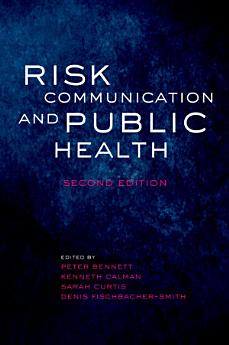Risk Communication and Public Health: Edition 2
Peter Bennett · Kenneth Calman · Sarah Curtis · Denis Fischbacher-Smith
Dec 2009 · OUP Oxford
Ebook
368
Pages
family_home
Eligible
info
reportRatings and reviews aren’t verified Learn More
About this ebook
Controversies about risks to public health regularly hit the news, whether about food safety, environmental issues, medical interventions, or "lifestyle" risks such as drinking. To those trying to manage or regulate risks, public reactions sometimes seem bizarre. To the public, the behaviour of those supposedly "in charge" can seem no less odd. Trust is currently at a premium. This new edition of Risk Communication and Public Health covers the theoretical and research background, and presents a wide range of contemporary case studies and the learning experiences from these, and the political, institutional and organisational issues they raise. It concludes with an analysis of the lessons learned and gives pointers for the future. The book offers international perspectives, and contributors include representatives from consumer organisations as well as public health practitioners and academics. This edition is substantially updated with new material and case studies, but retains the same focus - the improvement of communication and promotion of "good practice" in risk communication, in Government, the Health Service and elsewhere. This second edition presents a broad view of the issues around risk communication and public health in a way that will be of interest to a range of public health practitioners, managers and policy makers, postgraduate students and academics in a number of disciplines, and those interested in environmental health.
About the author
Following a first degree in Physics, Peter Bennett studied the logic, history and philosophy of science, obtaining his DPhil from Sussex University. He joined the Operational Research Group at Sussex, before moving to Strathclyde University, where he became Reader in Management Science and Director of Postgraduate Studies. At the same time, he was involved in applied research and consultancy projects for clients ranging from community groups to transnational companies. He joined the Department of Health as a Principal OR Analyst in 1996, and since then has been heavily involved in analyses of risks to Public Health. He produced the Department of Health guidelines on Risk Communication. He now leads a cross-disciplinary team of analysts in the Heath Improvement and Protection Directorate of the Department, and is acting Head of Profession for Operational Research. Sir Kenneth Calman is Chancellor of the University of Glasgow. He graduated in medicine (with commendation) in 1967. He moved into the Department of Surgery in Glasgow and proceeded to the Fellowship of the Royal College of Surgeons and an MD Thesis with Honours on Organ Preservation. In 1972, he was the MRC Clinical Research Fellow at the Chester Beatty Research Institute in London and returned to Glasgow in 1974 as Professor of Oncology. He remained in that post for 10 years. In 1984 he became Dean of Postgraduate Medicine and Professor of Postgraduate Medical Education at the University of Glasgow and Consultant Physician with an interest in palliative care at Victoria Infirmary, Glasgow. He is a member of the Nuffield Council on Bioethics and President of the Institute of medical Ethics. Sarah Curtis is Professor of Health and Risk at Durham University. She has extensive international research experience in geography of health and health services, especially on inequalities of health and access to health care, health care needs assessment, health impact assessment and development of healthy public policy. Her research covers topics including: adaption of health and social care systems to changing risks of climate change (funded by EPSRC); Health Impact Assessment of urban regeneration schemes, (for Dept of Health, and other agencies); development of healthy public policy (with agencies in Canada and UK); ESRC funded research on effects of the socio-economic environment on well-being and health of adults and children; research funded by British Academy on hospital design; International research on migration, health and wellbeing supported by ESRC; comparative research on geographical variation in psychiatric service use supported by the Office of Mental Health for New York State. Denis Smith is Professor of Management at the University of Glasgow. His main research interests are in the areas of: organisational resilience, risk and crisis management; adverse events in health care; complexity and organisational performance (especially around health care organisations and the emergency services); human error and systems failure; and the role of embedded error cost in strategic change. Professor Smith's work has been concerned with issues of risk management and business continuity and this has been carried out over a 25 year period. His early work was concerned with the evacuation of urban areas due to extreme events - an interest he maintains to this day. He has also undertaken research on the training and performance of crisis management teams, the production of emergency/contingency plans (and their limitations), and the processes by which vulnerability can be generated within organisations and urban 'space'.
Rate this ebook
Tell us what you think.
Reading information
Smartphones and tablets
Install the Google Play Books app for Android and iPad/iPhone. It syncs automatically with your account and allows you to read online or offline wherever you are.
Laptops and computers
You can listen to audiobooks purchased on Google Play using your computer's web browser.
eReaders and other devices
To read on e-ink devices like Kobo eReaders, you'll need to download a file and transfer it to your device. Follow the detailed Help Center instructions to transfer the files to supported eReaders.








